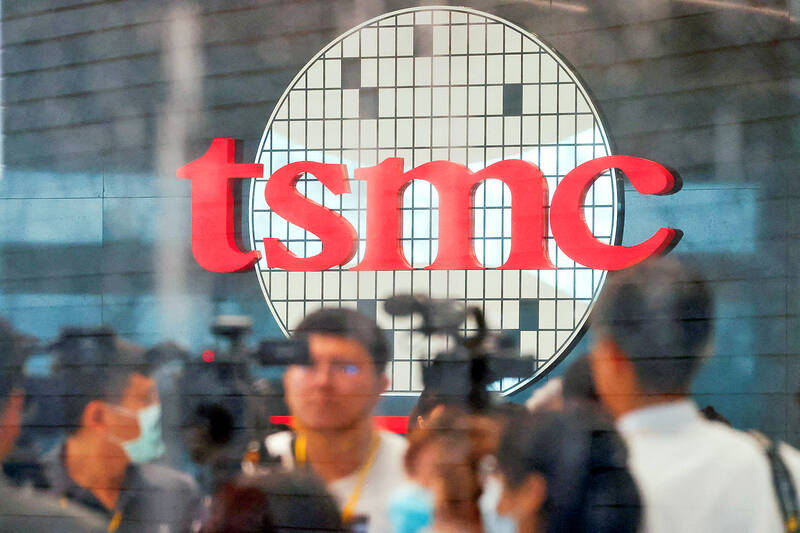Taiwan Semiconductor Manufacturing Co (TSMC, 台積電) yesterday said it has been collaborating with multiple memorychip makers in high-bandwidth memory (HBM) used in artificial intelligence (AI) applications for more than two years, refuting South Korean media report's about an unprecedented partnership with Samsung Electronics Co.
As Samsung is competing with TSMC for a bigger foundry business, any cooperation between the two technology heavyweights would catch the eyes of investors and experts in the semiconductor industry.
“We have been working with memory partners, including Micron, Samsung Memory and SK Hynix, on HBM solutions for more than two years, aiming to advance 3D integrated circuit [IC] design by delivering more memory capacity,” TSMC said in a statement.

Photo: Ann Wang, Reuters
“These cross-industry collaborations aim to provide designers with a full spectrum of proven solutions to tackle the rapidly growing demand in AI,” TSMC added.
TSMC, the world’s largest foundry service provider, has for the first time talked about its collaboration with Samsung Electronics, BusinessKorea reported on Thursday.
“Samsung and TSMC are jointly developing buffer-less HBM,” BusinessKorea quoted TSMC’s Ecosystem and Alliance Management head Dan Kochpatcharin as saying.
The collaboration is to start with HBM4, which is scheduled for mass production in the second half of next year, the magazine said.
The report contradicted a statement released by TSMC in 2022.
The company said that Samsung Memory was among the members of the newly created Open Innovation Platform (OIP) 3DFabric Alliance, together with US memorychip maker Micron Technologies Inc and SK Hynix Inc of South Korea among others. The alliance was initiated by TSMC.
Samsung Electronics memory product planning group vice president Kyungsoo Ha at the time said that by joining TSMC’s OIP 3DFabric Alliance, Samsung Memory would be able to further expand the scope of work and delivery of solutions for future HBM generations to help customers unleash system-level innovations.
TSMC last year said the alliance has made achievements through collaboration with key memory partners, including Micron, Samsung Memory and SK Hynix, to drive rapid growth in HBM3 and HBM3e to advance generative AI systems by delivering more memory capacity.

Sweeping policy changes under US Secretary of Health and Human Services Robert F. Kennedy Jr are having a chilling effect on vaccine makers as anti-vaccine rhetoric has turned into concrete changes in inoculation schedules and recommendations, investors and executives said. The administration of US President Donald Trump has in the past year upended vaccine recommendations, with the country last month ending its longstanding guidance that all children receive inoculations against flu, hepatitis A and other diseases. The unprecedented changes have led to diminished vaccine usage, hurt the investment case for some biotechs, and created a drag that would likely dent revenues and

Macronix International Co (旺宏), the world’s biggest NOR flash memory supplier, yesterday said it would spend NT$22 billion (US$699.1 million) on capacity expansion this year to increase its production of mid-to-low-density memory chips as the world’s major memorychip suppliers are phasing out the market. The company said its planned capital expenditures are about 11 times higher than the NT$1.8 billion it spent on new facilities and equipment last year. A majority of this year’s outlay would be allocated to step up capacity of multi-level cell (MLC) NAND flash memory chips, which are used in embedded multimedia cards (eMMC), a managed

CULPRITS: Factors that affected the slip included falling global crude oil prices, wait-and-see consumer attitudes due to US tariffs and a different Lunar New Year holiday schedule Taiwan’s retail sales ended a nine-year growth streak last year, slipping 0.2 percent from a year earlier as uncertainty over US tariff policies affected demand for durable goods, data released on Friday by the Ministry of Economic Affairs showed. Last year’s retail sales totaled NT$4.84 trillion (US$153.27 billion), down about NT$9.5 billion, or 0.2 percent, from 2024. Despite the decline, the figure was still the second-highest annual sales total on record. Ministry statistics department deputy head Chen Yu-fang (陳玉芳) said sales of cars, motorcycles and related products, which accounted for 17.4 percent of total retail rales last year, fell NT$68.1 billion, or

In the wake of strong global demand for AI applications, Taiwan’s export-oriented economy accelerated with the composite index of economic indicators flashing the first “red” light in December for one year, indicating the economy is in booming mode, the National Development Council (NDC) said yesterday. Moreover, the index of leading indicators, which gauges the potential state of the economy over the next six months, also moved higher in December amid growing optimism over the outlook, the NDC said. In December, the index of economic indicators rose one point from a month earlier to 38, at the lower end of the “red” light.